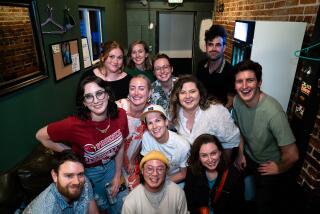Forget Stripper #1 and Go for the Robotic Eyeball
- Share via
My first two seasons as a sitcom writer spoiled me rotten.
I was on the staff of “Dinosaurs.” Yes, it was a puppet show. But it was a smart, satirical, prime-time puppet show. We wrote our scripts with almost zero input from suits, then watched amazed as puppeteers, voice actors and the strange, wonderful people in Jim Henson’s Creature Shop rendered it all hilariously on the screen.
There were times in that “Dinosaurs” writers’ room, near the end, when we would look at each other and say out loud, “It will never be like this again.”
And, indeed, it wasn’t--at least for a while. After “Dinosaurs,” it was on to one nightmare sitcom after another, each its own fresh level of hell. I worked side by side with the very best and brightest, laboring into the early hours in the service of pure, unadulterated crap. During the darkest days, it seemed that we all applied our considerable talents to just getting the studio audience to go “Woooh!”
A woooh was as good as a laugh, and all it really took was a harsh put-down, a racy reference or even just writing “Stripper #1 enters” in the stage directions.
Dark, dark times.
Eventually, though, I found myself in a bright place very much like that “Dinosaurs” writers’ room. I started working on animated cartoons.
Suddenly, I couldn’t go for the woooh even if I wanted to. No stripper would ever make it past the prudish network Standards and Practices folks. Our goal was simple: good stories, well told, with visual flare and lots of humor. My new colleagues and I argued passionately about three-act structure. Sure, I had long ago paid to hear Robert McKee rant about structure, but now I was actually applying the principles. Before sending off a storyboard artist to slave away for weeks on a tale, it was imperative that it hold up, that it be worth telling.
We were concerned about, I kid you not, theme. Never on any prime-time sitcom did we even so much as mention the theme. In cartoons, we often write two 11-minute stories for each half hour--and both must have a theme, rock-solid structure and jokes that make us laugh at table reads.
It was a writer’s heaven. But it could get intense.
The Disney animated science fiction-comedy series “Lloyd In Space” featured a character named Station, an onboard computer who functioned as our young protagonist’s guardian and who appeared only as a robotic eyeball at the end of a gooseneck tether.
Writers love to write for smart characters, and Station was the long-suffering smart one in a comically absurd cast. We wanted to tell a story about Station getting a real body, a chance to kick up his heels, to live life like other characters in the show. And that’s where the trouble started.
This particular story proved very difficult to break or plot out. The problem was the ending. Every time we’d re-break the story, we ended up at the same place: For the sake of the next episode, Station would have to return to normal, to give up his new body. And there was no other way to think about this except as a metaphor for death.
Now death is a fine theme, deftly explored in many animated series for children. The problem was in the room, in the beliefs held by writers around that table. Half the room strongly believed in an afterlife, certain we each have a soul that exists outside of our physical form. The other half felt just as strongly that this life, this body, is all we have and that we’d better make the best of it while we’re here.
In meeting after meeting, the two sides found it impossible to reconcile their philosophies. No one in that room was willing to tell a story he or she didn’t believe in. Tempers flared. Nobody would compromise. We learned a lot about what we really held sacred, but in the end, we couldn’t tell the story.
After weeks of debate, we decided to step back and see if there wasn’t some other approach to take. We ended up writing a charming, uncontentious script about robotic pen pals who fibbed to each other about being “real” and then had to scramble to keep up appearances when they finally met face to face.
We were off the existential hook, but it was pretty much guaranteed that there would be more challenging days ahead. We looked around the room at each other and smiled. We knew we were all spoiled rotten.
More to Read
The complete guide to home viewing
Get Screen Gab for everything about the TV shows and streaming movies everyone’s talking about.
You may occasionally receive promotional content from the Los Angeles Times.






